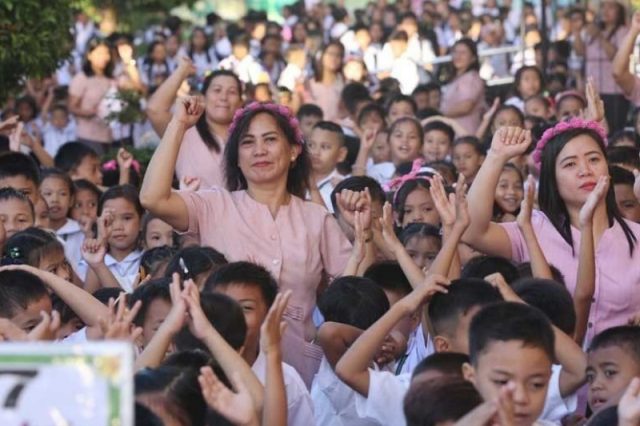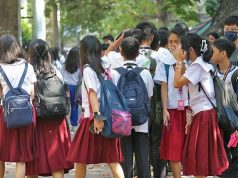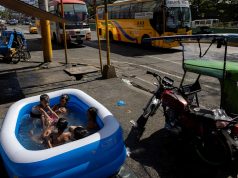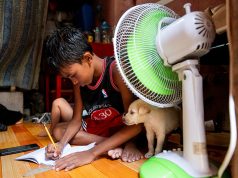The newly appointed head of the Department of Education (DepEd) will face a host of challenges.
This was mentioned by the Alliance of Concerned Teachers (ACT) Philippines, a non-traditional teachers’ organization in the country focused on advocating for the welfare of education workers and students. They expressed hopes that the education crisis would be properly addressed with the help of incoming DepEd Secretary Juan Edgardo “Sonny” Angara
Sen. Angara was selected to take over Vice President Sara Duterte’s reign in the education sector on Tuesday.
READ: Sara Duterte resigns as education chief
As a senator, he authored multiple laws and bills focused on education throughout the years.
These include the Free College and Kindergarten law, the National Athletes and Coaches Benefits and Incentives Act that helped develop Philippine sports and the Teachers’ Home in School Act that aims to provide public school instructors with living facilities near their workplace.
“[We] saw the decision as a much-improved choice compared to VP Sara Duterte who resigned from the education post recently,” ACT said in a statement.
“Game-changing measures are urgently needed to overturn the decline of our country’s education quality and to sufficiently capacitate the education system to perform its role in nation-building,” ACT emphasized.
The teachers’ group outlined several concerns from DepEd educators and students in a detailed statement. They expect Angara to address these issues during his tenure.
Education budget
The teachers are hopeful that the new DepEd secretary would “push for the doubling of the education budget to fulfill the United Nation’s standard of allocating education budget equivalent to six percent of the country’s gross domestic product (GDP).”
With an improved budget, ACT is calling for more classrooms and facilities in the future, as well as additional teaching items to reduce the class size to 20 students in kinder and 35 students in primary and secondary education.
Last year, the former DepEd chief requested to allocate P150 million of confidential and intelligence funds to the National Learning Recovery Program.
Then in December, The National Economic and Development Authority (NEDA) reported that the education sector was allotted a budget of P924.7 billion for this fiscal year. According to them, DepEd has been given the highest budget among the other government agencies.
Personnel support
With better budget allocation, education workers would be seen as more productive. ACT suggested more ways to boost productivity in the education sector.
This includes the push for the teacher’s and personnel salary increases, stating that the wage should be “P50,000 entry-level salary teachers and P33,000 monthly salary for Salary Grade I employees.”
As of June, the average base pay for a teacher is estimated to be around P21,000 to P30,000 according to GlassDoor, an online community platform for job search and careers.
The creation of sufficient education personnel items for schools has also been sought to lessen administrative duties by regularizing teachers and other educational employees.
Furthermore, public school teachers are requesting a 15-day sick leave grant, a P3,000 inflation adjustment allowance for all government employees, a lower optional retirement age to 56, enhanced pension benefits and exempt election service compensation from taxes.
“[We want to] ensure the enjoyment of academic freedom of all teachers, and full union rights of all education workers,” ACT said.
Improved learning for students
“[We hope for a] push for the development of culturally appropriate national assessment test, instead of relying on Programme for International Student Assessment (PISA), to determine the nature and extent of the learning crisis as well as design and implement an evidence-based education recovery program,” the party-list elaborated.
PISA indicates the country’s status on its basic education system. In 2022, the Philippines ranked bottom 10 out of 81 countries in terms of reading comprehension, mathematics and science.
Last month, PISA noted that Filipino students have one of the weakest creative thinking skills among 64 other countries.
ACT envisioned that this would be addressed with the help of sufficient and quality learning resources like gadgets, accessible textbooks and modules, internet allowance and more.
Revamping the K-12 curriculum has also been sought after in order, as well as a firm reinstatement of the Philippine History subject in schools.
“Philippine History [should be] a dedicated subject in the high school curriculum, with stress on factual Martial Law education to counter historical distortion [and] strengthen the teaching and use of Filipino and Mother Tongue in education,” they added.
ACT likewise called on Angara to “implement a democratic style of governance, hold regular dialogues and democratic consultations with education stakeholders on concerns that affect them, ensure the representation of teachers’ unions in all decision-making bodies that affect their welfare and of the education sector as a whole.”










